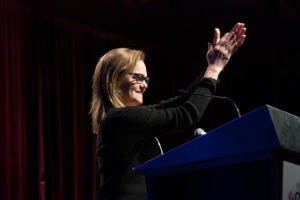
If you’re accustomed to train travel, you may know that wobbly walk from the café car back to your seat while attempting to balance hot coffees in a cardboard tray. You’re staggering, trying not to eject your beverages into an unsuspecting fellow passenger’s lap. In many ways 2018 rumbled along like that long and lurching locomotive, destabilizing and defying balance. There is a new level of stress, added to the ordinary stress of living, brought on by news cycles of politically motivated violence, sexual misconduct, and environmental destruction. Fires raged on the West Coast, hurricanes in the East, and tsunamis in the South Pacific. A presidential “emergency text message” even made its debut.
And yet somewhere in the microcosm of chaos, I hear stories of surviving by seeing and sinking into moments of personal joy. Occasionally, in beginning a staff meeting we reflect on these moments. And the field has some joyful ones this year.
The International Black Theatre Summit at Dartmouth: Coordinated by Dartmouth’s Monica Ndounou, this convening commemorated a summit of black theatre leaders, educators, and artists organized by August Wilson at the New Hampshire university 20 years ago, at the invitation of theatre professors Victor Leo Walker II and William Cook. This celebration and investigation of contemporary black theatre across continents demonstrated the ever-increasing depth and vitality of the work, even as many of the challenges offered up in August’s 1996 The Ground on Which I Stand speech persist. Congrats to Dr. Ndounou on a successful summit!
St. Louis: When we first thought about this conference city at the invitation of Steve Woolf, Mark Bernstein, Ron Himes, Rick Dildine, and Jenny Wintzer, we never imagined how much we would fall in love—with the people, the artists, and the reckoning with a complex history of racial divides and indigenous displacement. We held a conference in June, with an opening night party at the City Museum—a place of games and junk and things to climb on. The Ferguson-raised Palestinian American poet Naomi Shihab Nye opened the conference with a completely absorbing talk about her life, her family, and her process. She intertwined her poetry in ways that were seamless and had attendees reconnected with the possibility of beauty in everyday life, and the loving observations that inspire art. Miami, here we come!
Token Theatre Friends: What began as a biweekly web series of commentary by American Theatre senior editor Diep Tran and contributor Jose Solís on three different NYC shows at three price points is now a podcast of reviews, including a video interview with an artist. Whether or not Tran and Solís resonate with a particular production, their analyses are entertaining and engaging, and they make you want to attend, if for no other reason than to see whether you agree with their takeaways. In a world where arts journalism continues to decline, this new podcast series is a welcome lift. Now if we can take it national!
Leadership transition: This year continued an avalanche of announced retirements and new opportunities for artistic leaders, as well as news of women taking the helms in positions historically held by men: Hana Sharif succeeding Steve Woolf as artistic director of the Repertory Theatre of St. Louis, Stephanie Ybarra at Baltimore Center Stage, Maria Manuela Goyanes at Woolly Mammoth, Johanna Pfaelzer at Berkeley Rep, Marissa Wolf at Portland Center Stage. Our movement was founded largely by strong female artistic leaders, and we seem to be trending back to those origins.
The most-produced plays list: For the first time since American Theatre has been counting, women dominated in both the Top 10 plays to be produced this season at TCG theatres and the the Top 20 most-produced playwrights. As our publisher, Terry Nemeth, often says, “We are in a Golden Age of playwriting, led by women.” As Golden Age finds its way from the page to the stage, we are thrilled to see some movement toward the gender parity the field has longed for.
The survival of the National Endowment for the Arts: Soon after President Trump took office in 2017, he released his preliminary Fiscal Year 2018 budget, which called for the elimination of the NEA. Throughout the appropriations process for FY18, Congress didn’t just reject the president’s call to eliminate the agency; in March 2018, they passed an omnibus spending bill with a $3 million increase for the NEA! The Trump Administration renewed its proposal to eliminate the NEA in its budget proposal for FY19, but thanks to advocates speaking up and continued strong bipartisan support in Congress, both the House and the Senate have approved a $2 million increase for the NEA for FY19. That increase awaits passage by Congress and the president’s signature, while the NEA (and the rest of the government) operate on a Continuing Resolution that expires on Dec. 7.
So there was some good news in 2018. Looking ahead I have great hope for 2019 as we continue working together toward a better world for theatre and because of theatre.

